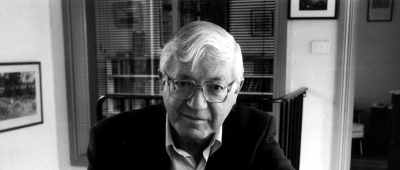Commentary
‘I can’t believe that you look back and say “I was unkind to people” … you’re not an envious person, you’re not a hateful person, you’ve got – one assumes – plenty of money. So why do you sit there and beat yourself up thinking that you’ve hurt people?’
Poor John Mangos. There he was on Sky News Australia presenting the interview programme Viewpoint last November. His interviewee was the great John Laws, who had a new book to promote and yet another spectacular controversy (this one involving his comments about Queer Eye for the Straight Guy’s Carson Kressley) to defend.
... (read more)How do dance and music fit together in a choreographic work? Even the briefest look at Australian collaborations across the arts suggests that endeavours vary widely. The National Library of Australia’s collections, which are particularly strong in the areas of music and dance, provide some interesting examples of the synergies that exist between these two art forms and that make cross-art form collaboration a richly rewarding area of study.
... (read more)My theme is the mixed and contentious business of reviewing: its influence, its limitations, its present condition in what we like to call our literary culture. I will largely confine my remarks to the literary pages of our newspapers and magazines. I don’t propose to comment on the learned journals – or criticism at monograph length issuing from the academy. (Not, sadly, that there is much of that kind of publishing in Australia these days.)
... (read more)At certain moments in Australia’s cultural history, dance has been the prime artistic force of the day. At those times, dance and its makers have inspired and enthused a whole generation of people. Dance has changed lives, has allowed careers to blossom in unexpected ways, and has created fanatical audiences. Dance had this power over Australians between 1936 and 1940, when three Russian ballet companies – Ballets Russes companies – toured Australia.
... (read more)This year for the third year in a row, Black Inc. is reprinting writing from HEAT in one of its ‘Best Australian’ anthologies, without seeking my permission as the magazine’s editor and publisher. They can do this because there is a legal loophole in Australia’s literary culture – literary magazines in this country do not normally have contracts with their authors. It is conventional to ask magazine editors for their permission before reprinting work that has appeared in their pages; but the fact is, if the author’s permission can be won it is entirely irrelevant, from a legal point of view what the magazine editor thinks.
... (read more)Manning Clark married Dymphna Lodewycks in 1939. In the following years they lived in Oxford, Tiverton, Geelong and Melbourne, before moving to Canberra in 1949. On 29 October 1953 they took up residence in a new house, designed by their friend Robin Boyd, in Tasmania Circle, Forrest. It was to be their home for the rest of their lives. It was not a particularly large house, and the Clarks and their six children must have found it cramped at times. The only upstairs room was Manning’s study, reached by a ladder from the entrance hall. It was in this room, with its view of Mount Ainslie and Black Mountain, that he wrote the six volumes of A History of Australia, several other books, and countless articles, reviews, lectures and speeches.
... (read more)A biographer follows the life of a chosen person or a chosen group or people, or perhaps a particular scene or epoch. An autobiographer, like a snail outed by the Sun, looks back at his or her tracks and tries to explain how he or she got this far, possibly hinting at vindication or in more extravagant mode, self-immolation. Unfortunately I am a poet, and a prose writer only to earn a living. My field is verse, but l am involved on a daily basis with literature in diverse forms, especially journalism, broadcasting, and reviewing. I believe also that I am a secret biographer and autobiographer, as so much of the poetry I write and read shadows the functions of biography.
... (read more)It was the last day of the Giorgione exhibition in Vienna. The Kunsthistorisches Museum had organised a colloquium to coincide with it. Art historians – in this case the Giorgione brotherhood or amici in studi giorgioneschi. – had arrived for a final interrogation. Confrontations between individual work. of art, hanging adjacent to one another in the context of an exhibition, allowed for unique comparisons of some paintings by Giorgione, some attributed to him, some inspired by him. All were connected to the most enigmatic artist in the history of art.
... (read more)In recent years there has been much headshaking over the effect globalisation may be having on regional cultures. Economic rationalism of production is causing massive shifts of population across the world. Is there an equivalent cultural dispersion? The Art Gallery of South Australia’s exhibition Arid Arcadia: Art of the Flinders Ranges has immediate rel ...
Hannah Arendt called her reflection on the Pentagon papers – the US Department of Defense’s secret, then leaked, documentary investigation into the American intervention in Vietnam – ‘Lying in Politics’. As Arendt pointed out at the beginning of her essay: ‘the basic issue raised by the papers is deception ... The famous credibility gap, which has been with us for six years, has suddenly opened up into an abyss. The quicksand of lying statements of all sorts, deceptions as well as self-deceptions, is apt to engulf any reader who wishes to probe this material.’
... (read more)


